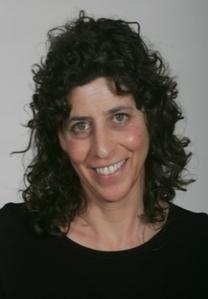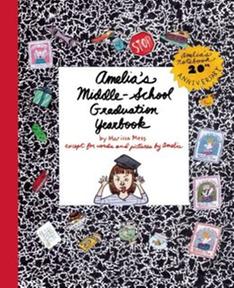 Writer-illustrator Marissa Moss has sold more than four million copies of her Amelia's Notebooks, a mash-up of middle-grade novel and illustrations in a composition-style cover. In 2013, Moss launched a small press called Creston Books, which specializes in children's books, and this month she publishes Amelia's Middle-School Graduation Yearbook (Creston Books). She lives in Berkeley, Calif.
Writer-illustrator Marissa Moss has sold more than four million copies of her Amelia's Notebooks, a mash-up of middle-grade novel and illustrations in a composition-style cover. In 2013, Moss launched a small press called Creston Books, which specializes in children's books, and this month she publishes Amelia's Middle-School Graduation Yearbook (Creston Books). She lives in Berkeley, Calif.
On your nightstand now:
Mark Twain's Innocents Abroad, about his tour of Europe and the Middle East, absolutely hilarious. I'm reading him for reference for the book I'm working on now, and loving every page. I'm also enjoying Rosemary Wells's On the Blue Comet (I thought she only wrote picture books, and it was a surprise to discover her middle-grade novels). Plus, I just finished Jacqueline Woodson's Brown Girl Dreaming.
Favorite book when you were a child:
That's probably a tie between Dr. Seuss's The Cat in the Hat, which I loved for the Cat's mischief-making--or really any Dr. Seuss book; I learned to love language through his rollicking rhymes--and Roald Dahl's James and the Giant Peach. I savored the illustrations by Nancy Ekholm Burkert as much as the magical words. And again, it's tough to pick which Roald Dahl book. I loved them all!
Your top five authors:
This is an impossible question, but the writers who I've read over and over again, the ones where the language lives on inside of me are a smaller list. If forced, I'd say: Shakespeare, Vladimir Nabokov, J.K. Rowling, Mark Twain, Dr. Seuss. And Kenneth Grahame, for The Wind and the Willows, illustrated by E.H. Shepard, another book I loved for the drawings as much as the text.
Book you've faked reading:
Ulysses by James Joyce. Has anyone read the whole thing?

Bongo Fishing by Thacher Hurd. It's his first middle-grade novel and laugh-out-loud funny. I love his characters, especially the aliens who are like "ordinary midget grandparents." Thacher is enormously talented and this book deserves to be better known.
Book you've bought for the cover:
I picked up the first Harry Potter book because of the gorgeous cover art by Mary Grandpré. Luckily, the story lived up to the art.
Book that changed your life:
I think all good books change your life, at least a little. They give you experiences you wouldn't otherwise have or provoke you to ask questions you hadn't thought of. You live more deeply when you read. But the books that have the most profound effects are those you read as a child. I felt empowered by the successes of Dahl's underdog heroes--yes, weak children can come out on top, even in a world controlled by irrational adults! I devoured a lot of science fiction/fantasy as a kid and loved the "what if" questions they asked (and answered). I was a big Ursula Le Guin and J.R.R. Tolkien fan.
Favorite line from a book:
Again, I have many favorites, but I collect great first sentences and then share them with kids when I give writing workshops. One of the best is "Mr. and Mrs. Dursley of number four, Privet Drive, were proud to say they were perfectly normal, thank you very much." (From the first Harry Potter book.) We talk about what gives the sentence that ineffable quality of voice--and whether we believe that Mr. and Mrs. Dursley are at all normal, which, of course, we don't.
Book you most want to read again for the first time:
Dante's Divine Comedy. The first time I read it, from the Inferno to Purgatory, to Heaven, I had this incredible sense of first suffering with the sinners, then slogging through Purgatory, and as I got to Heaven, the air seemed clearer, purer. I was carried along on this spiritual journey into the rarefied glory of Heaven. It was astonishing that Dante could create that sensation just from words. I've tried re-reading it, but although the writing is still brilliant, it's a different experience, knowing what's coming. I can re-read the Inferno and still enjoy how Dante gets revenge on all his enemies, but the ascent to Heaven can't be recaptured. And maybe that's the way it should be.
Which authors have most influenced you?
Lynda Barry has been a huge influence, especially when I started the Amelia books. Her visceral memory of her childhood encouraged me to write about mine with the same kind of ordinary details. That's what sparked the first Amelia's Notebook.
I've also drawn a lot from funny writers. Writing humor is hard, but you can definitely learn from how other people do it. I love the humor in Christopher Paul Curtis's books, in Louis Sachar's Wayside School Books, and in everything James Marshall has written and illustrated.

